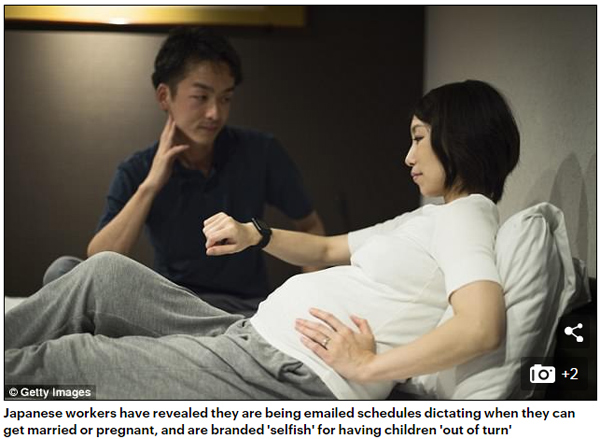35岁才准生小孩?日本企业规定结婚生育年龄 Japanese workers are being emailed schedules telling them when they can get pregnant
中国日报网 2018-04-08 09:00

众所周知,日本过劳死和人口危机很严重,但最近曝出的一个新闻让人真切地领略到了日本工作文化的可怕。在日本一些女员工占多数的企业,企业给女职员规定了结婚和怀孕的时间表,谁要是不按顺序提前结婚或怀孕就要受到惩罚。
|

截图来自每日邮报网站 |
Japanese workers are being given schedules dictating when they can get married or give birth, it has been revealed.
媒体近日曝出,日本企业给员工制定了结婚或生小孩的时间表。
The disturbing trend first came to light after a nursery worker's husband spoke out to say his wife was being bullied by her boss for getting pregnant 'out of turn'.
这种令人不安的风气被曝光是因为最近有一名保育员的丈夫站出来直言,称自己的妻子因为“不按顺序”怀孕而遭到上司欺凌。
Since then dozens of other women have come forward to share similar stories, with one 26-year-old woman saying she was told to wait until 35 to conceive - despite already suffering from fertility issues.
从那以后,数十名女性分享了相似的经历,一名26岁的女性表示,按公司规定她必须等到35岁才能怀孕——而她本身就有怀孕困难问题。
The initial complaint came in a letter to newspaper Mainichi Shimbun last month, from the husband of a woman who works at a nursery in Aichi Prefecture.
上个月日本每日新闻社收到了第一封相关的投诉信,这封信是一名在爱知县托儿所工作的女性的丈夫写来的。
He wrote: 'Eight months into our marriage, in January of this year, we found out that my wife was pregnant.
他写道:“结婚八个月后,在今年一月份,我们发现我妻子怀孕了。”
'My wife, who is a child care provider, appeared glum and anxious over the news.
“从事幼儿看护工作的妻子得知消息后,露出忧郁和焦虑的神色。”
'The director at the child care center where she works had determined the order in which workers could get married or pregnant, and apparently there was an unspoken rule that one must not take their "turn" before a senior staff member.
“她就职的托儿所的所长规定了员工结婚或怀孕的顺序,显然那里有一条不成文的规定,就是不能比资深员工更早结婚或怀孕。”
'My wife and I went together to apologise. "We're sorry we got pregnant," we said.
“我的妻子和我一起去道歉。我们说:‘对不起,我们怀孕了。’”
'The director grudgingly accepted our apology, but since the next day, has been chiding my wife with harsh words, such as, "How could you so selfishly break the rules?"
“所长不情愿地接受了我们的道歉,但从第二天开始,就一直用刻薄的言语指责我的妻子,比如‘你怎么能这么自私地破坏规矩?’”
'My wife feels guilty thinking about the hard labor conditions of her colleagues.'
“我妻子想到同事们艰辛的劳动条件就感到内疚。”
While the man admits 'we are at fault for not planning well' he goes on to ask: 'Who benefits from having their "turn" to have children dictated, and following those rules?'
尽管这名男子承认,“我们没有计划好,是我们的错”,但是接下来他发问道:“按顺序生小孩和遵守这些规定,是谁受益呢?”
The letter prompted a national outpouring of sympathy and confessions from other workers that they were being forced to live by similar rules.
这封信引发了许多日本国民的同情,还有很多其他职员也坦承自己被迫按类似的规定来生活。
Toko Shirakawa, a journalist who specialises in Japan's low birth rate, said the policy is common in workplaces where the majority of staff are female to make sure the workload is spread evenly.
专门报道日本低生育率的记者Toko Shirakawa说,这种政策在女职员占多数的公司很常见,目的是确保工作量均匀分配。
|

截图来自每日邮报网站 |
In another case, a 26-year-old working at a cosmetics company in the Tokyo suburb of Mitaka said she was sent an email mapping out the marriage and birthing schedule for herself and 22 female colleagues.
在另一个案例中,一名在东京市郊三鹰市的化妆品公司工作的26岁女子表示,她收到了一封电子邮件,里面规定了自己和其他22名女员工结婚和生育的时间表。
The email also came with a warning that 'work gets backed up if four or more people take time off at the same time. Selfish behavior will be subject to punishment.'
这封电子邮件还警告说:“如果四名以上的员工同时请假,这部分工作量就要落到其他人头上。自私的行为会受到惩罚。”
She was then told by a supervisor that she would have to wait until age 35 before getting pregnant, despite suffering from fertility issues.
一名主管告诉她说,她必须等到35岁才能怀孕,尽管自身已经有不孕问题。
'How are they going to take responsibility if I put off getting pregnant and lose my chances to have children altogether?,' she said.
她说:“如果我推迟怀孕,导致自己完全丧失了生育机会,那他们要怎么负责呢?”
Japan is notorious for its tough working conditions and punishing schedules which have led to some staff dropping dead on the job.
日本因工作条件苛刻和惩罚性的日程安排而臭名昭著,某些员工甚至因此而死在了工作岗位上。
Miwa Sado, 31, a journalist for public broadcaster NHK, died in 2013 from heart failure after logging 159 hours of overtime in a single month.
31岁的Miwa Sado是公共广播公司NHK的记者,2013年她因为在一个月内超时工作159个小时,导致心脏衰竭而死。
The country even has a word - karoshi - which means 'death from overwork'.
日本甚至有一个词专门来形容过劳死——karoshi。
That culture has left precious little time for raising a family and is rapidly causing a population crisis, with fewer babies born last year than at any time since records began in 1899.
这种文化留给养育家庭的时间非常少,并迅速导致了人口危机,去年出生的婴儿数量降到1899年开始统计以来的最低点。
In turn, that places more pressure on workers as they have to take on increased duties to make up for the declining numbers of staff.
这一现状转而向劳动者们施加了更多压力,因为他们必须承担更多职责,才能弥补员工数量下降产生的劳动力不足。
The government has vowed to tackle the problem by raising the fertility rate from its current 1.44 children per woman to 1.8 children per woman by 2025.
政府已承诺要解决这一问题,声称要在2025年前把生育率从目前的平均每位女性生育1.44个小孩提高到每位女性1.8个小孩。
Japan now provides free education, has expanded nursery care, and allows fathers to take paternity leave in order to tackle the problem.
为了解决这一问题,日本现在提供免费教育,增加了托幼服务机构,让父亲们休陪产假。
Local governments have even set up speed-dating services across the country to get people to partner up.
日本各地的地方政府甚至推出了速配服务,让人们能够找到伴侣。
英文来源:每日邮报
翻译&编辑:丹妮

















 英语点津微信
英语点津微信 双语小程序
双语小程序